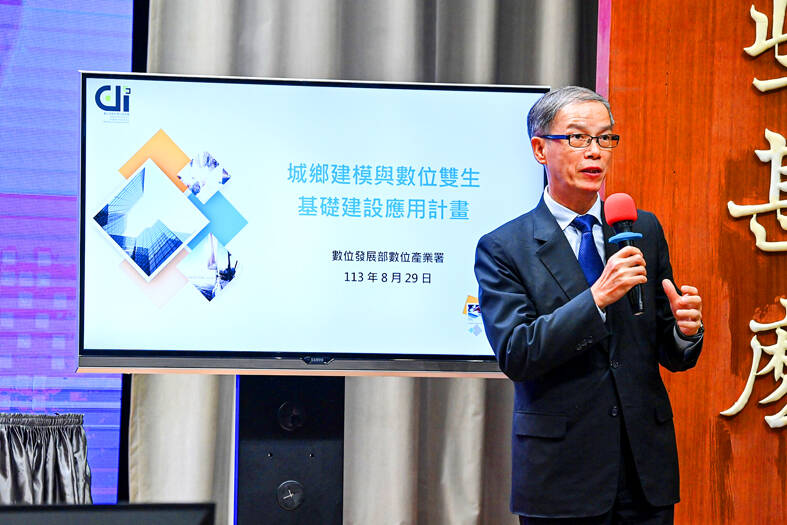The government is to allocate NT$1.8 billion (US$56.4 million) over the next four years to build basic digital infrastructure for “digital twins” technology applications, the Cabinet said on Thursday.
The program aims to attract overall investment of NT$2 billion to boost the tourism, culture, entertainment and gaming sectors, and close the “digital gap” between rural and urban centers by encouraging local governments to collaborate with the private sector, Ministry of Digital Affairs officials told a news conference.
The Cabinet on May 31 announced a roadmap for the Asia Silicon Valley Development Plan 3.0 in response to growth of generative artificial intelligence (AI), 5G and satellite telecommunication, and to help Taiwanese industry meet the twin challenges of transitioning to digital and net zero business models, ministry officials said.

Photo courtesy of the Executive Yuan
The program for “digital twin” applications is among the efforts to build up the needed basic infrastructure at the local level, they said.
Implementing the digital twins program would boost innovation and growth for Taiwan’s entertainment, e-commerce, e-learning, sports technology, tourism, culture and entertainment sectors, and elevate the competitiveness of local digital business sectors, the ministry said.
“In the past, most public project budgets were spent on building and hardware projects. For the digital twins program, we have taken examples from other countries,” officials said.
They cited Japan’s Virtual Shibuya, the Assassin’s Creed Unity video game developed by French-Canadian game developer Ubisoft Montreal, and South Korea’s “Virtual Seoul” platform.
Under the new program, for the first time the government would have public project budgets for developing software, 3D modeling, online networks and related digital technologies, and to build up the nation’s digital content library, officials said.
Administration for Digital Industries Deputy Director-General Lin Chun-hsiu (林俊秀) said in other countries 3D modeling and software development are joint ventures between the public and private sectors.
After a while these become available for commercial use and innovative applications for concerts, large-scale e-gaming competitions, e-commerce platforms, sports technology, online learning, tourism, culture and entertainment, he said.
“In the future, these can be applied for immersive cultural and historic heritage exhibitions, 5G mobile connection, 3D modeling, augmented reality and generative AI. It would facilitate more interactive experiences,” he said.
“The applications can be used to create landscape and props for gaming and virtual concerts. They would reduce expenses and allow government agencies to implement new projects more quickly,” Lin said.
He said the new digital twins program would bring about NT$4.5 billion of economic benefits via 14 infrastructure projects across the nation.
Twenty-six specially designated digital 3D model sites would be used, and 56 firms are estimated to invest, he said, adding that more than 40 new digital applications are expected to be produced.

Chinese Nationalist Party (KMT) Chairman Eric Chu (朱立倫), spokeswoman Yang Chih-yu (楊智伃) and Legislator Hsieh Lung-chieh (謝龍介) would be summoned by police for questioning for leading an illegal assembly on Thursday evening last week, Minister of the Interior Liu Shyh-fang (劉世芳) said today. The three KMT officials led an assembly outside the Taipei City Prosecutors’ Office, a restricted area where public assembly is not allowed, protesting the questioning of several KMT staff and searches of KMT headquarters and offices in a recall petition forgery case. Chu, Yang and Hsieh are all suspected of contravening the Assembly and Parade Act (集會遊行法) by holding

PRAISE: Japanese visitor Takashi Kubota said the Taiwanese temple architecture images showcased in the AI Art Gallery were the most impressive displays he saw Taiwan does not have an official pavilion at the World Expo in Osaka, Japan, because of its diplomatic predicament, but the government-backed Tech World pavilion is drawing interest with its unique recreations of works by Taiwanese artists. The pavilion features an artificial intelligence (AI)-based art gallery showcasing works of famous Taiwanese artists from the Japanese colonial period using innovative technologies. Among its main simulated displays are Eastern gouache paintings by Chen Chin (陳進), Lin Yu-shan (林玉山) and Kuo Hsueh-hu (郭雪湖), who were the three young Taiwanese painters selected for the East Asian Painting exhibition in 1927. Gouache is a water-based

Taiwan would welcome the return of Honduras as a diplomatic ally if its next president decides to make such a move, Minister of Foreign Affairs Lin Chia-lung (林佳龍) said yesterday. “Of course, we would welcome Honduras if they want to restore diplomatic ties with Taiwan after their elections,” Lin said at a meeting of the legislature’s Foreign Affairs and National Defense Committee, when asked to comment on statements made by two of the three Honduran presidential candidates during the presidential campaign in the Central American country. Taiwan is paying close attention to the region as a whole in the wake of a

OFF-TARGET: More than 30,000 participants were expected to take part in the Games next month, but only 6,550 foreign and 19,400 Taiwanese athletes have registered Taipei city councilors yesterday blasted the organizers of next month’s World Masters Games over sudden timetable and venue changes, which they said have caused thousands of participants to back out of the international sporting event, among other organizational issues. They also cited visa delays and political interference by China as reasons many foreign athletes are requesting refunds for the event, to be held from May 17 to 30. Jointly organized by the Taipei and New Taipei City governments, the games have been rocked by numerous controversies since preparations began in 2020. Taipei City Councilor Lin Yen-feng (林延鳳) said yesterday that new measures by